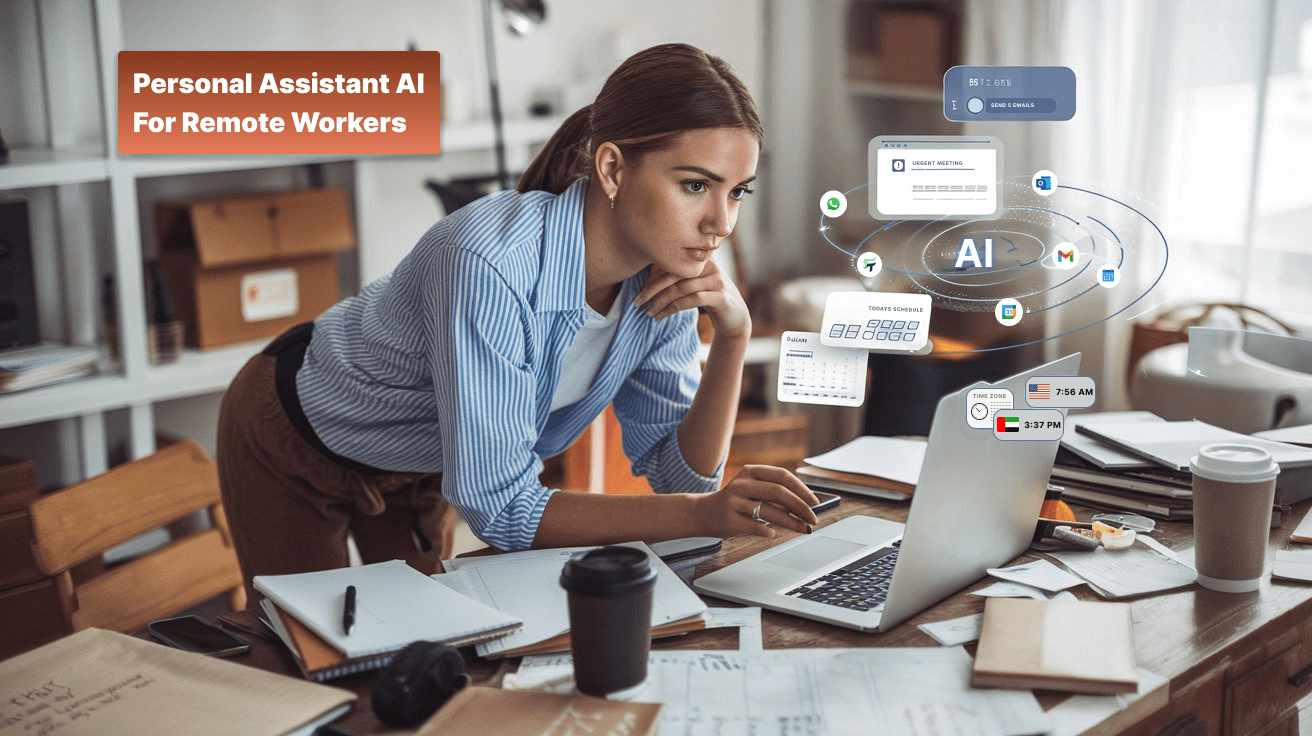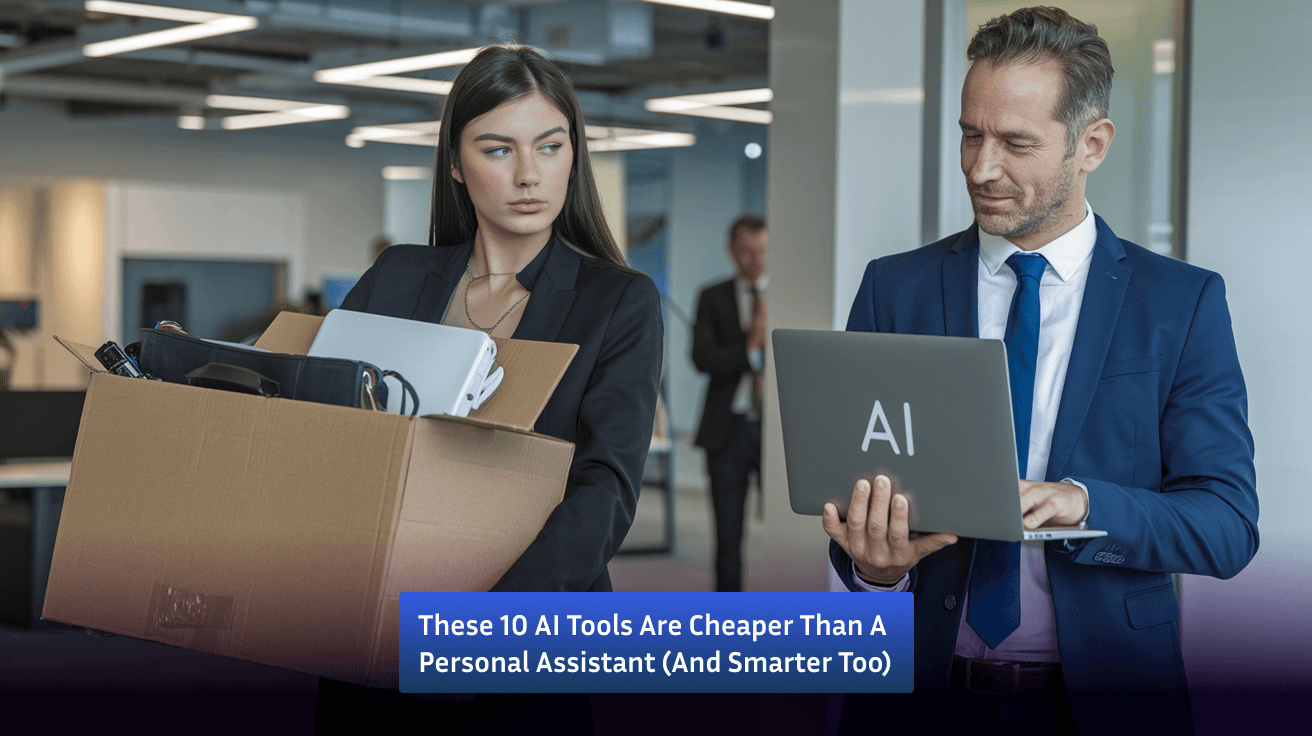Oct 15, 2024
How Remote Workers Are Using AI Personal Assistants
A Typical Monday for Sarah, a Remote Worker
Sarah, a remote office worker is frantically scrolling through a sea of emails. “Where is it?” she mutters, her eyes darting across the screen. With her fifth meeting of the day coming up, she could use some help finding the invite link. Time is ticking away, but Sarah’s stress is building; she’s already late for two meetings today, one due to a time zone mix-up and another from clicking the wrong link. She’s buried under unread messages, calendar notifications, and chat pings.
“This can’t happen again,” Sarah sighs, launching a frantic keyword search in her email. With just two minutes left, she finally digs up the elusive invite, hidden in a thread she thought she had already checked twice. As she clicks to join, she wonders if there might be a better way to manage this chaos.
Emergence of AI in Remote Work Scenarios
The rise of remote work has driven an increase in digital tools aimed at maintaining and boosting productivity. AI personal assistants have become essential, helping professionals like Sarah handle routine tasks and generate valuable insights. Research suggests that digital assistants can significantly reduce administrative hours, allowing professionals to focus on high-value activities.
Core Benefits of AI Personal Assistants
Automation of Routine Tasks:
AI assistants can automatically schedule meetings, manage emails, and organize files. This minimizes time spent on repetitive tasks, freeing professionals to concentrate on more critical issues.
Peak Productivity Analysis:
AI tools analyze work patterns to determine when users are most productive, suggesting optimal times to tackle tasks. This insight helps professionals structure their workday more efficiently.
Enhanced Decision-Making:
AI offers immediate, data-backed insights, enabling professionals to make informed decisions. With access to trends and data analysis, AI empowers strategic decision-making.
Better Coordination:
AI-powered personal assistants support real-time translation, sentiment analysis, and effective communication, making collaboration between remote teams smoother. This improved coordination results in a more efficient workflow for distributed teams.
Beyond task automation, AI assists in integrating various aspects of a professional's daily life. For example, AI-powered email management reduces time spent drafting messages, while smart scheduling helps avoid meeting conflicts. Voice-to-text capabilities enable professionals to dictate notes or messages while on the move, making multitasking more efficient.
Multi-Account Integration: A Time Saver
A standout feature of modern AI personal assistants is their ability to manage multiple accounts through a single interface. This is particularly beneficial for professionals handling multiple roles or projects, as it consolidates communication channels into one manageable platform, saving time and reducing complexity.
The Science Behind Success
AI personal assistants leverage advanced machine learning, natural language processing, and pattern recognition to improve performance over time. Their low error rates in interpreting commands mean users can delegate tasks with confidence, knowing the AI will deliver accurate results.
Empirical Benefits: What the Numbers Say
Studies on the impact of AI personal assistants reveal impressive benefits:
Time Savings: Users report saving up to 10-15 hours per week on administrative tasks.
Improved Focus: AI enables professionals to concentrate on strategic, high-value work, leaving mundane tasks to the assistant.
Better Work-Life Balance: 65% of users report improved management of work hours, freeing up time for personal activities.
Enhanced Decision-Making: 82% of managers using AI assistants make more data-informed decisions.
The Human Perspective: Real-World Feedback
Users frequently highlight how AI personal assistants enhance their productivity and simplify workflows. A marketing executive remarked, “Having an AI assistant is like having an efficient personal aide who’s always available.” Startup founders appreciate how AI tools streamline their daily operations, allowing them to focus on scaling their businesses instead of managing small details.
FastTrackr.AI: A Leading Example
FastTrackr.AI is a prime example of a user-friendly and feature-rich AI assistant. Integrated with popular messaging platforms like WhatsApp, it allows users to access its benefits without switching platforms. Its advanced email and calendar management capabilities save users considerable time, while its voice-to-text feature boosts productivity during multitasking.
By analyzing user patterns and preferences, FastTrackr.AI optimizes workflows in ways other tools simply cannot match, offering a glimpse into the future of remote work productivity.
Conclusion: Embracing the AI Revolution in Remote Work
Integrating AI personal assistants into remote workspaces represents a new frontier in productivity and collaboration. As these tools evolve, their ability to automate tasks and provide valuable insights will continue to grow. FastTrackr.AI exemplifies this potential, helping professionals and organizations achieve new levels of efficiency. Adopting AI-driven solutions will be key for those looking to thrive in the ever-changing landscape of remote work.




